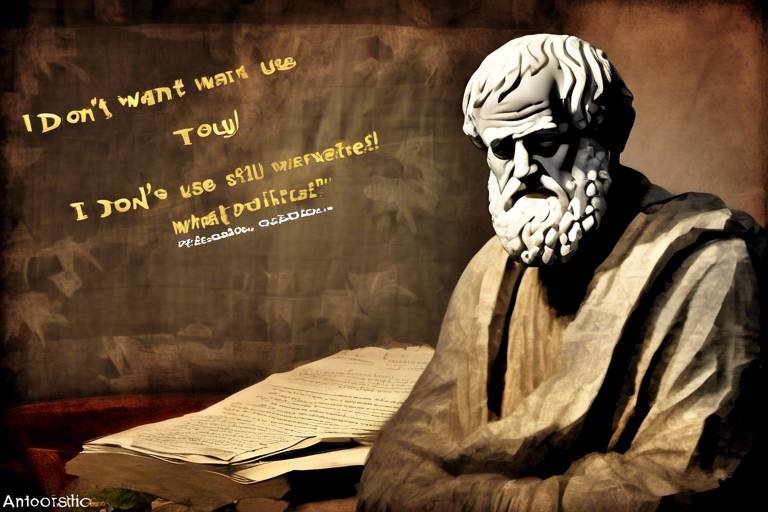The Politics of Utilitarian Philosophy
Utilitarianism, at its core, is a philosophical approach that champions the idea of maximizing overall happiness and minimizing suffering. This principle has profound implications in the realm of politics, where decisions can affect millions of lives. But what does it mean to govern with the greatest happiness in mind? Imagine a society where policies are crafted not just to benefit a select few but to uplift the entire community. This is the essence of utilitarian philosophy in politics.
Historically, utilitarianism emerged during the Enlightenment, a time when reason and individual rights began to take precedence over tradition. Thinkers like Jeremy Bentham and John Stuart Mill laid the groundwork for this ideology, arguing that the morality of an action is determined by its outcomes. Bentham famously proposed the "greatest happiness principle," suggesting that the best actions are those that produce the most pleasure for the greatest number of people. Mill built on this by emphasizing qualitative differences in pleasures, advocating for a nuanced understanding of happiness that considers individual rights and justice.
As we delve deeper into the political landscape shaped by utilitarianism, we see its principles influencing a variety of governance structures and legal frameworks. For instance, laws that aim to reduce crime or improve public health are often justified by their potential to enhance societal well-being. However, the application of utilitarianism in politics is not without its challenges. Critics argue that an overemphasis on collective happiness can lead to the neglect of individual rights. How do we balance the needs of the many against the rights of the few? This question lies at the heart of utilitarian debate.
In contemporary governance, utilitarianism continues to play a pivotal role. From healthcare policies to environmental regulations, the principle of maximizing public good is often a guiding force. Policymakers frequently employ utilitarian calculations to assess the potential impacts of their decisions. For example, when debating a new healthcare initiative, officials might weigh the projected benefits against the costs, aiming for the greatest overall improvement in public health. However, this approach can lead to ethical dilemmas, especially when the happiness of the majority infringes upon the rights of minorities.
As we navigate the complexities of modern politics, it's essential to recognize that utilitarianism is not a one-size-fits-all solution. Its adaptability is both a strength and a weakness. While it provides a clear framework for evaluating the consequences of actions, it may also oversimplify the intricate nature of human experience. The future of utilitarianism in politics will likely involve a blend of its core principles with other ethical considerations, ensuring that individual rights are respected while still striving for collective welfare.
- What is utilitarianism? Utilitarianism is a philosophical theory that suggests the best action is the one that maximizes overall happiness or utility.
- Who are the key figures in utilitarianism? The primary figures include Jeremy Bentham, who introduced the concept, and John Stuart Mill, who expanded upon it.
- How does utilitarianism apply to politics? Utilitarianism influences political decision-making by prioritizing policies that aim to achieve the greatest good for the greatest number.
- What are the critiques of utilitarianism? Critics argue that utilitarianism can overlook individual rights and lead to ethical dilemmas, particularly when the happiness of the majority comes at the expense of the minority.
- Is utilitarianism still relevant today? Yes, utilitarian principles continue to inform contemporary political discourse and policy-making, especially in areas like healthcare and environmental policy.

The Historical Roots of Utilitarianism
To truly appreciate the significance of utilitarianism in political theory, we must journey back to its historical roots. This philosophical doctrine, which emphasizes the greatest happiness for the greatest number, was primarily shaped by two pivotal figures: Jeremy Bentham and John Stuart Mill. Their contributions laid the groundwork for a framework that would not only influence ethical thought but also reshape governance and policy-making across the globe.
Utilitarianism emerged in the late 18th century, a time when the Enlightenment was challenging traditional norms and advocating for reason and individual rights. Bentham, often regarded as the father of utilitarianism, introduced the idea that actions should be judged based on their consequences. He famously stated that the rightness of an action is determined by its ability to produce pleasure or happiness, while wrongness is tied to the pain it causes. This principle of hedonistic calculus proposed a method for measuring happiness, allowing for a systematic approach to ethics and governance.
Following Bentham, John Stuart Mill expanded upon these ideas in the 19th century. Mill introduced a more nuanced understanding of happiness, arguing that not all pleasures are equal. He distinguished between higher pleasures (intellectual and moral) and lower pleasures (sensory and immediate), suggesting that a society should prioritize the former. Mill's work, particularly in his book Utilitarianism, emphasized the importance of individual rights and justice, which became critical in addressing the potential shortcomings of a purely consequentialist approach.
As utilitarianism gained traction, it began to influence various political movements, especially during the rise of liberalism. The philosophy provided a robust framework for advocating social reforms, such as universal suffrage, education access, and labor rights. It argued that policies should be designed to maximize overall happiness, thus giving a moral imperative to political action. This was particularly relevant in the context of the Industrial Revolution, where the disparity between the wealthy and the working class became glaringly evident.
However, the historical journey of utilitarianism has not been without its challenges. Critics have often pointed out that the focus on the majority's happiness can lead to the neglect of minority rights. This concern has sparked debates about the balance between collective well-being and individual liberties, making it a topic of ongoing discussion in political theory. The evolution of utilitarian thought, from Bentham's quantitative approach to Mill's qualitative distinctions, reflects an attempt to address these concerns while still holding onto the core idea of maximizing happiness.
In summary, the historical roots of utilitarianism are deeply intertwined with the evolution of modern political thought. The contributions of Bentham and Mill have not only shaped ethical frameworks but have also provided a lens through which we can view the complexities of governance and societal welfare. As we continue to navigate contemporary issues, understanding these historical foundations becomes essential for grasping the implications of utilitarianism in today’s political landscape.
- What is utilitarianism? Utilitarianism is a philosophical theory that suggests the best action is the one that maximizes overall happiness or utility.
- Who are the key figures in utilitarianism? The key figures include Jeremy Bentham, who founded the theory, and John Stuart Mill, who expanded and refined it.
- What are the criticisms of utilitarianism? Critics argue that it can overlook individual rights and lead to justifying harmful actions if they benefit the majority.
- How does utilitarianism apply to modern politics? Utilitarianism influences policy-making by prioritizing actions that promote the greatest good for the largest number of people.

Key Principles of Utilitarianism
Utilitarianism is a philosophical doctrine that centers around the notion of maximizing happiness and minimizing suffering. At its core, this ethical framework suggests that the best action is the one that produces the greatest good for the greatest number of people. This principle, often summarized as the "greatest happiness principle," serves as a guiding light for both individual choices and public policies. But what does this really mean in practice? Let's dive deeper into the fundamental tenets of utilitarianism and see how they shape our understanding of morality and governance.
One of the foundational ideas of utilitarianism is the concept of consequentialism. This means that the morality of an action is judged solely by its outcomes. In other words, it’s not the intention behind an action that matters, but rather the results it produces. Imagine you're at a crossroads: one path leads to a small benefit for a few, while the other leads to a significant benefit for many. A utilitarian would argue that the latter is the more ethical choice, as it maximizes overall happiness.
Another essential principle is the idea of utility, which refers to the overall well-being that an action can provide. Utilitarians often measure utility in terms of pleasure and pain, positing that actions should aim to increase pleasure and reduce pain. This perspective can sometimes lead to ethical dilemmas, especially when considering actions that may benefit the majority but harm a minority. For example, should a government implement a policy that boosts economic growth at the expense of a marginalized community? This is where the tension between individual rights and collective happiness becomes apparent.
To better illustrate these principles, let’s consider the following table that outlines the differences between act and rule utilitarianism:
| Aspect | Act Utilitarianism | Rule Utilitarianism |
|---|---|---|
| Definition | Focuses on the consequences of individual actions. | Focuses on the consequences of following general rules. |
| Decision Making | Evaluates each situation independently. | Considers the long-term effects of adhering to rules. |
| Flexibility | More flexible, allowing for exceptions. | More rigid, promoting consistency. |
| Example | Stealing medicine to save a life. | Following laws against theft to maintain social order. |
As we can see, act and rule utilitarianism offer different approaches to ethical decision-making. Act utilitarianism is more adaptable and can account for unique situations, while rule utilitarianism emphasizes the importance of consistency and societal norms. Both perspectives contribute to a richer understanding of how utilitarian principles can be applied in real-world scenarios.
Ultimately, the key principles of utilitarianism challenge us to think critically about our choices and their implications. They encourage a forward-looking approach to ethics, one that prioritizes the collective good over individual desires. This framework can be incredibly powerful, especially in political decision-making, where the stakes are often high and the consequences far-reaching. But, as with any philosophy, it comes with its own set of challenges and critiques, which we will explore in the following sections.
- What is the main goal of utilitarianism? The main goal is to maximize happiness and minimize suffering for the greatest number of people.
- How does utilitarianism differ from other ethical theories? Unlike deontological ethics, which focuses on rules and duties, utilitarianism is concerned with the outcomes of actions.
- Can utilitarianism justify harmful actions? Yes, it can lead to justifying harmful actions if they result in a greater overall good, which raises ethical concerns.

Act vs. Rule Utilitarianism
When diving into the depths of utilitarian philosophy, one quickly encounters two distinct branches: act utilitarianism and rule utilitarianism. Both aim to promote the greatest happiness, but they approach this goal from different angles, much like two roads that lead to the same destination. Understanding these differences is essential, especially when considering their implications for political policies and ethical judgments.
Act utilitarianism is all about evaluating the consequences of individual actions. It posits that the morality of an action is determined solely by its outcomes. In other words, if an action leads to the greatest happiness for the greatest number of people, then it is deemed morally right. Imagine a scenario where a politician must decide whether to implement a new policy that could benefit the majority but might harm a minority. An act utilitarian would focus on the immediate consequences of that specific decision, weighing the happiness generated against the suffering caused. This approach can lead to some surprising conclusions, often prioritizing short-term gains over long-term stability.
On the flip side, rule utilitarianism takes a broader perspective. Instead of examining individual actions, it suggests that we should follow rules that generally promote the greatest happiness. This means that certain actions may be deemed wrong even if they produce good outcomes in specific cases. For instance, a rule utilitarian might argue against lying, even if a particular lie could lead to a positive result. The rationale here is that if everyone lied whenever it seemed beneficial, trust would erode, ultimately leading to more harm than good. Thus, rule utilitarianism emphasizes the importance of consistency and the long-term implications of adhering to ethical guidelines.
To illustrate the differences between these two approaches, consider the following table:
| Aspect | Act Utilitarianism | Rule Utilitarianism |
|---|---|---|
| Focus | Individual actions | General rules |
| Decision-making | Based on specific outcomes | Based on adherence to rules |
| Flexibility | Highly flexible, context-dependent | More rigid, consistent application |
| Long-term implications | May overlook long-term consequences | Considers long-term societal effects |
These differences significantly impact political decision-making. For example, a government faced with a crisis might lean towards act utilitarianism, justifying immediate actions that produce quick results. However, this can lead to ethical dilemmas and potential injustices. In contrast, adopting a rule utilitarian approach might foster more sustainable policies but could also result in slower decision-making processes, as leaders weigh the broader implications of their actions.
In essence, both act and rule utilitarianism offer valuable insights into ethical reasoning, yet they also present challenges. Politicians and policymakers must navigate these complexities, balancing the need for immediate results with the importance of long-term societal well-being. As we continue to explore the role of utilitarianism in contemporary governance, understanding these distinctions will be crucial for shaping just and equitable societies.
- What is the primary difference between act and rule utilitarianism? Act utilitarianism focuses on the outcomes of individual actions, while rule utilitarianism emphasizes following rules that generally lead to the greatest happiness.
- Can act utilitarianism lead to unethical decisions? Yes, because it evaluates actions based solely on immediate outcomes, it may justify decisions that harm individuals for the sake of the majority.
- Why is rule utilitarianism considered more stable? Rule utilitarianism promotes consistency in ethical decision-making, which helps maintain trust and social order over time.

Implications for Law and Governance
Utilitarianism, at its core, is about maximizing overall happiness and minimizing suffering. This fundamental principle has profound implications for law and governance. Imagine a society where laws are crafted not just for the sake of order, but to enhance the well-being of its citizens. This is the essence of applying utilitarian philosophy to legal frameworks. When lawmakers embrace utilitarian principles, they prioritize policies that yield the greatest good for the greatest number, often leading to significant reforms in areas such as healthcare, education, and welfare.
One of the most striking aspects of utilitarianism in governance is its focus on outcomes rather than intentions. In a legal context, this means that the effectiveness of laws is measured by their ability to produce beneficial results for society. For instance, consider a law aimed at reducing crime rates. A utilitarian approach would not only look at the law's punitive measures but also evaluate its impact on community safety and overall happiness. This shift in perspective can lead to innovative solutions, such as restorative justice programs that focus on rehabilitation rather than mere punishment.
Moreover, utilitarianism encourages a flexible approach to governance. Laws that do not serve the greater good can be re-evaluated and amended. This adaptability is essential in a rapidly changing society where new challenges arise constantly. For example, in response to climate change, utilitarian principles may drive lawmakers to implement stricter environmental regulations, recognizing that the long-term happiness of future generations outweighs short-term economic gains. Such decisions underscore the dynamic nature of utilitarianism, making it a powerful tool for progressive governance.
However, the application of utilitarianism in law is not without its challenges. Critics argue that focusing solely on the majority's happiness can lead to the marginalization of minority rights. This raises an essential question: at what point does the pursuit of the greater good infringe on individual liberties? A balance must be struck, ensuring that while the majority benefits, the rights and needs of the minority are not overlooked. To navigate this delicate balance, lawmakers often incorporate elements of justice and fairness into their utilitarian calculations.
In practical terms, the implications of utilitarianism for law and governance can be illustrated through a table that outlines key areas where this philosophy has been applied:
| Area of Governance | Utilitarian Application | Example |
|---|---|---|
| Healthcare | Maximizing public health outcomes | Universal healthcare policies |
| Education | Enhancing access and quality of education | Public funding for schools in low-income areas |
| Environmental Policy | Balancing economic growth with ecological sustainability | Carbon tax legislation |
Ultimately, the implications of utilitarianism for law and governance are profound and far-reaching. By prioritizing the greater good, societies can create legal systems that not only uphold justice but also foster overall happiness and well-being. As we continue to grapple with complex societal issues, the relevance of utilitarian philosophy in shaping effective governance structures becomes increasingly apparent.
- What is utilitarianism? Utilitarianism is an ethical theory that suggests the best action is the one that maximizes overall happiness or utility.
- Who are the key figures in utilitarian philosophy? Jeremy Bentham and John Stuart Mill are two of the most influential thinkers in the development of utilitarianism.
- How does utilitarianism influence law? Utilitarianism influences law by promoting policies that aim for the greatest good for the greatest number, often leading to reforms in various sectors.
- Can utilitarianism conflict with individual rights? Yes, critics argue that focusing solely on the majority's happiness can sometimes infringe on the rights of individuals or minority groups.
- Is utilitarianism still relevant today? Absolutely! Utilitarianism remains a significant framework in contemporary political discourse and ethical decision-making.

Utilitarianism in Policy-Making
Utilitarianism plays a significant role in shaping public policy, acting as a guiding principle for governments striving to achieve the greatest good for the greatest number. The essence of this philosophy lies in its focus on outcomes, evaluating the effectiveness of policies based on their ability to enhance overall happiness and well-being. When policymakers adopt a utilitarian approach, they often prioritize decisions that maximize collective benefits, which can lead to more equitable resource allocation and improved societal welfare.
In practice, utilitarianism in policy-making involves a careful assessment of the potential consequences of various options. For instance, when implementing health care reforms, a government might analyze how different policies impact the population's health outcomes, economic stability, and access to services. By weighing these factors, policymakers can choose solutions that yield the best net benefits for society. However, this method is not without its challenges. The complexity of human behavior and the unpredictability of societal reactions can complicate the assessment of potential outcomes.
Moreover, the application of utilitarian principles often requires a balance between short-term gains and long-term sustainability. For example, a government might consider a policy that provides immediate financial assistance to low-income families. While this decision could enhance happiness in the short run, it’s crucial to evaluate the long-term implications on economic growth and social equity. This kind of analysis can lead to difficult choices where the benefits to one group may inadvertently harm another, raising ethical questions about fairness and justice.
Utilitarianism also encourages the use of data and evidence-based approaches in policy formulation. By employing statistical models and research findings, policymakers can better predict the outcomes of their decisions and ensure that they are aligned with the utilitarian goal of maximizing happiness. For example, a city might utilize traffic data to design a public transport system that reduces congestion and pollution, benefiting both commuters and the environment. This data-driven approach not only enhances the effectiveness of policies but also fosters transparency and accountability in governance.
However, critics argue that a strict utilitarian framework can overlook individual rights and minority interests. When the focus is solely on the majority's happiness, there is a risk of marginalizing vulnerable populations. For instance, a policy that benefits a large group but adversely affects a small community raises ethical concerns. To address this, some policymakers advocate for a more nuanced approach that incorporates elements of justice and rights alongside utilitarian principles. This blend can help ensure that while striving for the greater good, the needs and rights of individuals are not trampled upon.
In conclusion, while utilitarianism serves as a powerful tool in policy-making, it requires careful consideration of both the immediate and far-reaching effects of decisions. The challenge lies in maintaining a balance between maximizing collective happiness and protecting individual rights. As societies evolve, the integration of utilitarian principles with a focus on justice and equity will be essential in crafting policies that are not only effective but also fair and inclusive.
- What is utilitarianism in policy-making? Utilitarianism in policy-making refers to the approach where decisions are made based on their ability to produce the greatest good for the greatest number of people.
- How does utilitarianism influence government decisions? It influences government decisions by encouraging the evaluation of policies based on their outcomes, aiming to maximize overall happiness and welfare.
- Are there any drawbacks to utilitarianism? Yes, one major drawback is that it can sometimes overlook individual rights and the needs of minority groups in favor of the majority's happiness.
- Can utilitarianism coexist with other ethical frameworks? Absolutely! Many policymakers advocate for a blended approach that incorporates utilitarianism along with principles of justice and individual rights.

Critiques of Utilitarian Philosophy
Utilitarianism, while celebrated for its focus on the greater good, is not without its critics. One of the most significant critiques revolves around the potential neglect of individual rights. Imagine a society where the happiness of the majority is prioritized at the expense of a minority's well-being. This scenario raises ethical questions: should the happiness of many justify the suffering of a few? Critics argue that utilitarianism can lead to morally questionable decisions when the needs of the few are sacrificed for the happiness of the many.
Another common critique is the challenge of measuring happiness or utility. How can one quantify happiness? Is it fair to compare the joy of a fulfilled life with the relief of a painful existence? The subjective nature of happiness complicates the utilitarian framework. For instance, a government might decide to implement a policy that benefits the majority but fails to consider the nuanced experiences of those adversely affected. This leads to a fundamental question: can a philosophy that relies on such subjective measures truly serve as a reliable guide for ethical decision-making?
Additionally, critics point out that utilitarianism can inadvertently promote a 'tyranny of the majority.' In democratic societies, the majority often holds significant power, and utilitarian principles can be manipulated to justify oppressive policies. For example, if a majority decides that certain groups should be marginalized for the sake of societal happiness, this could lead to systemic injustices. This critique emphasizes the need for a balanced approach that safeguards individual rights while still pursuing the common good.
Furthermore, there are concerns about the implications of utilitarianism in political contexts. The potential for moral dilemmas arises when policymakers are faced with decisions that pit the happiness of one group against another. Consider a situation where a government must allocate limited healthcare resources: should they prioritize treatments for the majority, even if it means denying care to a minority with rare conditions? Such dilemmas highlight the complexities of applying utilitarian principles in real-world scenarios.
In summary, while utilitarianism offers a compelling framework for ethical decision-making focused on the collective good, it is essential to recognize its limitations. The critiques surrounding individual rights, the measurement of happiness, and the potential for unjust policies underscore the need for a more nuanced approach to governance and ethics. As we navigate the complexities of modern society, it becomes increasingly clear that a singular focus on utility may not suffice in addressing the diverse needs of all individuals.
- What is utilitarianism? Utilitarianism is a philosophical theory that suggests that the best action is the one that maximizes overall happiness or utility.
- Who are the key figures in utilitarian philosophy? Jeremy Bentham and John Stuart Mill are two of the most influential thinkers associated with utilitarianism.
- What are some common critiques of utilitarianism? Critics often point to issues related to individual rights, the difficulty of measuring happiness, and the potential for unjust policies.
- How does utilitarianism apply to modern politics? Utilitarian principles can influence policy-making, particularly in areas concerning public welfare and resource allocation.

Utilitarianism and Contemporary Politics
In the fast-paced world of contemporary politics, where decisions can have far-reaching consequences, utilitarianism stands as a guiding principle for many political leaders and policymakers. This philosophy, which advocates for actions that promote the greatest happiness for the greatest number, resonates deeply in today's governance structures. But how does this age-old theory hold up against the complexities of modern society? Is it truly effective in addressing the multifaceted challenges we face? Let's dive deeper into its implications.
Utilitarianism's influence can be seen in various policy-making arenas, from healthcare to environmental regulations. For instance, when governments are faced with the decision of allocating limited resources, they often turn to utilitarian principles to guide their choices. By evaluating the potential outcomes of different policies, leaders aim to maximize overall well-being. This approach has led to significant reforms in public health, where the focus is on achieving the best health outcomes for the largest segment of the population.
However, the application of utilitarianism in contemporary politics is not without its challenges. Critics argue that a strict adherence to utilitarian principles can lead to the neglect of minority rights. For example, consider a scenario where a government decides to implement a policy that benefits the majority but adversely affects a small group of individuals. In such cases, the question arises: does the end justify the means? This dilemma highlights the tension between utilitarian ideals and the need for justice and fairness in a democratic society.
Moreover, the rapid changes in societal values and technological advancements complicate the utilitarian framework. With the rise of social media and digital platforms, public opinion can shift dramatically overnight. Policymakers must navigate this landscape carefully, balancing the immediate desires of the majority with long-term consequences. As such, the challenge lies in ensuring that utilitarianism evolves alongside these changes, adapting to new ethical considerations while remaining focused on the greater good.
To better understand the practical implications of utilitarianism in politics, let’s look at a few notable examples:
- Healthcare Policy: Many countries adopt a utilitarian approach in healthcare, prioritizing policies that provide the most significant health benefits to the largest number of citizens. This often involves cost-benefit analyses to determine which treatments or interventions yield the best outcomes.
- Environmental Regulations: Governments may implement regulations that aim to reduce carbon emissions based on the utilitarian belief that the long-term benefits of a healthier planet outweigh the short-term economic costs.
- Public Safety Measures: In times of crisis, such as during a pandemic, leaders may impose restrictions that limit individual freedoms for the sake of protecting public health, arguing that the overall benefit to society justifies these actions.
As we look to the future, the role of utilitarianism in politics seems poised to grow. The increasing complexity of global challenges—such as climate change, income inequality, and social justice—requires a nuanced understanding of how to balance competing interests and outcomes. In this context, utilitarianism offers a framework that encourages policymakers to consider the broader implications of their decisions, fostering a more equitable and just society.
In conclusion, while utilitarianism provides a robust tool for evaluating political decisions and guiding ethical considerations, it is essential to remain vigilant about its limitations. As we navigate the intricate landscape of contemporary politics, the challenge will be to harness the strengths of utilitarian philosophy while ensuring that the rights and voices of all individuals are respected and heard.
- What is utilitarianism? Utilitarianism is a philosophical theory that suggests that the best action is the one that maximizes utility, typically defined as that which produces the greatest well-being of the greatest number of people.
- How does utilitarianism influence modern politics? Utilitarianism influences modern politics by guiding policymakers in making decisions that aim to maximize the overall happiness and welfare of society.
- What are the criticisms of utilitarianism? Critics argue that utilitarianism can overlook individual rights, lead to unjust outcomes for minorities, and simplify complex moral dilemmas into a single metric of happiness.
- Can utilitarianism adapt to contemporary issues? Yes, utilitarianism can adapt to contemporary issues by incorporating new ethical considerations and balancing short-term desires with long-term consequences.

Case Studies in Utilitarian Politics
Utilitarianism isn't just a theoretical framework; it finds its way into the practical realm of politics, shaping policies and decisions that affect millions. To truly understand its impact, let’s dive into some compelling case studies that illustrate how utilitarian principles are applied in real-world scenarios. One notable example is the implementation of public health policies, particularly during crises such as the COVID-19 pandemic. Governments worldwide faced the daunting task of balancing individual freedoms with the collective good. In many cases, lockdowns and social distancing measures were justified through a utilitarian lens, aiming to minimize infection rates and save lives, even at the cost of restricting personal liberties.
Another significant case study can be drawn from environmental policy. Governments often grapple with the challenge of climate change, where utilitarianism plays a crucial role in decision-making. For instance, the introduction of carbon taxes is a classic example of a utilitarian approach. By imposing a tax on carbon emissions, the intent is to reduce pollution and promote sustainable practices, thus benefiting society as a whole. While some industries may suffer economically in the short term, the long-term goal is to create a healthier planet for future generations. This illustrates the utilitarian principle of the greatest good for the greatest number, even if it means making tough choices in the present.
Moreover, consider the realm of healthcare. In many countries, the allocation of resources—such as organ transplants, medical treatments, and funding for public health initiatives—often relies on utilitarian principles. For example, triage systems in emergency medical situations prioritize patients based on the likelihood of survival and the potential for recovery. This approach, while controversial, aims to maximize the overall health benefits for the population, ensuring that resources are allocated where they can do the most good.
In the realm of education, utilitarianism also surfaces in discussions about funding and resource allocation. Governments may decide to invest heavily in certain educational programs that demonstrate a high return on investment for society, such as STEM (Science, Technology, Engineering, and Mathematics) initiatives. The rationale is simple: by equipping future generations with skills that are in high demand, society as a whole benefits from a more educated workforce, leading to economic growth and innovation.
While these case studies highlight the effectiveness of utilitarianism in shaping policies, they also raise important questions about its limitations. Critics argue that a strict utilitarian approach can overlook the rights of minorities or lead to morally questionable decisions. For instance, if the majority benefits from a policy that harms a small group, is that truly just? This tension between the collective good and individual rights remains a hot topic in political discourse.
As we analyze these case studies, it's clear that utilitarianism offers valuable insights into the complexities of governance and ethical decision-making. However, the challenge lies in balancing the pursuit of the greatest happiness with the need to protect individual rights and ensure fairness. The ongoing dialogue among policymakers, ethicists, and the public will continue to shape the future of utilitarianism in politics.
- What is utilitarianism? Utilitarianism is a philosophical theory that advocates for actions that maximize happiness and well-being for the majority.
- Who are the key figures in utilitarian philosophy? Prominent figures include Jeremy Bentham, who founded the theory, and John Stuart Mill, who expanded on Bentham's ideas.
- How does utilitarianism apply to politics? Utilitarianism influences political decisions by prioritizing policies that aim to achieve the greatest good for the greatest number of people.
- What are some critiques of utilitarianism? Critics argue that it can lead to the neglect of individual rights and may justify morally questionable actions if they benefit the majority.
- Can utilitarianism adapt to modern societal issues? Yes, utilitarianism continues to evolve as it addresses contemporary challenges, such as climate change and public health crises.

The Future of Utilitarianism in Politics
As we gaze into the crystal ball of political philosophy, the future of utilitarianism presents a fascinating tapestry woven with threads of ethical dilemmas, societal needs, and technological advancements. The world is evolving at a breakneck pace, and with it, the challenges we face are becoming increasingly complex. Will utilitarianism, with its focus on the greatest happiness for the greatest number, adapt to these changes? Or will it falter under the weight of its own principles?
Imagine a world where decisions are made not just with a focus on outcomes but also on the intricate web of individual rights and justice. The potential for utilitarianism to evolve lies in its ability to integrate with other ethical frameworks. For instance, could deontological ethics—which emphasizes duties and rights—find common ground with utilitarian principles? This fusion could create a more holistic approach to governance, where the happiness of the majority does not trample the rights of the minority.
Moreover, the rise of technology and data analytics offers a new frontier for utilitarian thought. With the ability to analyze vast amounts of data, policymakers can better predict the outcomes of their decisions. This data-driven approach can enhance the effectiveness of utilitarianism by providing empirical evidence of what policies truly lead to the greatest happiness. However, this reliance on data also raises questions: What happens when data is misinterpreted or manipulated? The ethical implications of data usage in policy-making must be carefully navigated to avoid creating a society that prioritizes numbers over human experiences.
Another significant aspect of the future of utilitarianism is its role in addressing global challenges such as climate change, inequality, and public health crises. These issues require a collective response that prioritizes the well-being of the global community. Utilitarianism can serve as a guiding principle in these discussions, encouraging policies that maximize overall happiness while minimizing harm. However, the challenge lies in defining what constitutes "happiness" in a diverse world with varying values and beliefs.
As we consider the trajectory of utilitarianism, it is essential to acknowledge the criticisms that have been levied against it. Critics argue that the focus on outcomes can lead to morally questionable decisions, such as sacrificing the rights of individuals for the sake of the majority. In the future, it will be crucial for utilitarianism to address these concerns head-on. A more nuanced understanding of happiness that incorporates justice and rights could be the key to its survival and relevance in contemporary politics.
In conclusion, the future of utilitarianism in politics is not set in stone. It holds the potential to evolve and adapt, embracing new challenges and integrating with other ethical frameworks. As we navigate the complexities of modern governance, the question remains: Can utilitarianism rise to the occasion and provide a robust foundation for a just and equitable society? Only time will tell, but the conversation is more important now than ever.
- What is utilitarianism? Utilitarianism is an ethical theory that suggests that the best action is the one that maximizes overall happiness or utility.
- Who are the key figures in utilitarian philosophy? The most notable figures include Jeremy Bentham and John Stuart Mill, who laid the groundwork for utilitarian thought.
- How does utilitarianism apply to modern politics? Utilitarianism influences policy-making by emphasizing outcomes that benefit the majority, often guiding decisions on public welfare and resource allocation.
- What are the main critiques of utilitarianism? Critics argue that utilitarianism can overlook individual rights and lead to morally questionable decisions by prioritizing the majority's happiness over justice.
Frequently Asked Questions
- What is utilitarianism?
Utilitarianism is a philosophical theory that suggests that the best action is the one that maximizes overall happiness or utility. It emphasizes the consequences of actions and is often summarized by the phrase "the greatest good for the greatest number."
- Who are the key figures in the development of utilitarian philosophy?
The most notable figures in utilitarian philosophy are Jeremy Bentham, who is considered the founder of modern utilitarianism, and John Stuart Mill, who expanded on Bentham's ideas and introduced concepts like qualitative differences in pleasures.
- What are the main principles of utilitarianism?
The primary principle of utilitarianism is the idea of the greatest happiness. This means that actions are judged based on their outcomes, specifically whether they increase overall happiness and reduce suffering. This principle guides ethical decision-making and political policies.
- What is the difference between act and rule utilitarianism?
Act utilitarianism focuses on the consequences of individual actions, evaluating each situation on a case-by-case basis. In contrast, rule utilitarianism considers the consequences of following general rules that lead to the greatest good, promoting consistency and predictability in decision-making.
- How does utilitarianism impact law and governance?
Utilitarian principles significantly influence legal frameworks and governance structures by prioritizing laws and policies that aim to maximize public welfare. This approach encourages lawmakers to consider the broader implications of their decisions on society as a whole.
- What are the critiques of utilitarian philosophy?
Critics argue that utilitarianism can overlook individual rights and justice, leading to morally questionable decisions. For example, sacrificing one person's well-being for the greater good can raise ethical dilemmas, challenging the validity of utilitarian reasoning in certain situations.
- How is utilitarianism relevant in contemporary politics?
Utilitarianism remains a crucial framework in modern political discourse, influencing policy decisions on issues like healthcare, education, and environmental regulations. Its focus on outcomes helps address current societal challenges by promoting policies that aim to enhance overall well-being.
- Can you provide examples of utilitarianism in action?
Real-world examples include public health policies that prioritize vaccination programs to protect the majority, or economic policies designed to reduce poverty by reallocating resources. These cases illustrate how utilitarian principles can guide effective governance and ethical decision-making.
- What does the future hold for utilitarianism in politics?
The future of utilitarianism in political thought may involve adapting to new societal issues, such as climate change and technological advancements. As challenges evolve, the principles of utilitarianism may be refined to ensure they remain relevant and effective in promoting the common good.



















